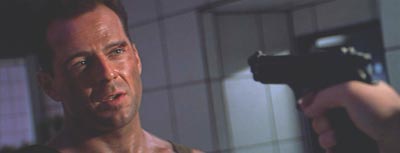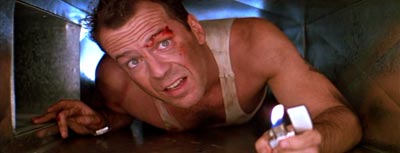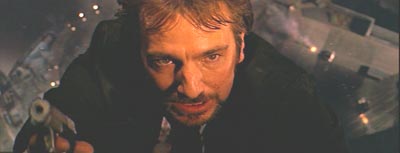Die Hard
The best of the vest.

The cinematic legacy of the Reagan action era is encapsulated in two simple lessons. Firstly, Commando taught us that there's no one problem or dictatorship that cannot be overcome by biblically-proportioned firepower. Secondly, and arguably of more importance to the national pride of our American cousins, no mobilised force on Earth is a match for the blue collar Yank, no matter how organised they may be. With the Cold War thawing out though, the Everyman was in need of a new foe, a foe so deadly it could strike any time, anywhere, and in a sharp suit. Die Hard, proving just how benevolent it really is to it's viewers, gives us two such enemies.
All right, all right. Actually it's one enemy and one mildly threatening intruder, but the message to both is the same. Die Hard came not just at a time when America was waking up to the notion of foreign terrorism, our chief source of protagonism here, but also the realisation that it's economy was under attack from foreign industrialism. What? The Japs just dropped an unemployment bomb on Detroit? Right, we'll give them a bloody good seeing-to while we're at it. Actually the threat from the latter was at the time a far more tangible adversary, but you don't exactly see many action movies where a chain-smoking, be-vested New York cop walks into a Honda showroom in Okinawa and battles hordes of sales reps with a Beretta and a sharp tongue. Note to Steven Seagal: don't even think about it.
Starting with a last-ditch romantic effort rather than an act of random violence, Die Hard sees Big Apple cop John McClane (Bruce Willis) arrive at LAX with a head still reasonably covered in hair and full of thoughts about getting back with his estranged wife. Having left NY for a career with the Nakatomi Corporation, Holly McClane nee Gennaro (Bonnie Bedelia) is now based at their office tower in Los Angeles where John is heading to meet her for the Christmas party. Unbeknown to the guests, some other visitors are making their way to the shindig, but their intention isn't to snaffle the mulled wine.

Comapny president Joseph Takagi certainly didn't invite the Euro-terror outfit lead by Hans Gr?ber (Alan Rickman), but they're coming anyway and their suits are even sharper than those of the hosts. Their mission: to relieve the Nakatomi vaults of several billion dollars worth of negotiable bonds. Hardly your honourable cause, but then Die Hard isn't trying to showcase any noble intentions of freedom for oppressed foreigners. Rather it's telling Johnny Abroad to haul ass the hell out of fortress America.
Not that in doing so it evangelises all aspects of American law enforcement quite so much as it does the street-level blues. When the action kicks off (and how), with Gr?ber and his boys capping serious ass and launching hot lead all over the shop at anything resembling a member of The Law, Die Hard limits the heroics to those of McClane while quite rightly portraying the encroaching Federal authorities as inept, bumbling beaurocrats. Eschewing traditional thinking, any posturing or bravado on the part of anyone other than Willis' character is generally rewarded with a swift rocket up the behind. In doing so director John McTiernan effectively channels all our empathy toward John and his increasingly dirty vest, which, coupled with Willis' brilliantly tough yet vulnerable central performance, makes for much more involved viewing than your usual action fare.
It's debateable wether Willis has ever been better than he is here. With his Moonlighting charm transposed wholesale, Willis' McClane is immediately likeable, but the real key to the character's success is not in his wit, but rather his frailty. True, McClane dishes out some brutal punishment to the hostage takers, but he also gets punished in such a fashion that we're never lulled into that old Hollywood comfort notion of the Invincible Avenger. This is a man who knows how to use a handgun to great effect, but also one who knows he's outnumbered and is far from convinced himself that he'll make it out of Nakatomi Plaza in anything other than a body bag. It's this combination that proves to be Die Hard's ace in the hole, and McTiernan and his lead use it to near devastating effect.

Not that the devastation is all McClane's. Far from your usual ex-military or freedom fighter stereotypes, the terrorists here are an anonymous bunch of money-grabbers who rather than be made to feel remorse for their mercenary ethos actually revell in it. "You're nothing but a common thief," suggests Holly to nefarious event organiser Gr?er. "I'm an exceptional thief, Mrs. McClane," he retorts "and since I'm moving up to kidnapping you should be more polite". Rickman approaches his role with a dangerous mix of almost comforting, sauve sarcasm and moments of shocking violence that lulls the audience into a false sense of security then whips the rug out from under them, punishing you for daring to like a man whose motives are so morally corrupt. That you do still like him, yet want to cheer his ultimate demise shows just how good a job Rickman makes of an essentially cardboard character.
Support is lent the chief protagonists by a number of talented sorts, most noticably the late Alexander Godunov as Gr?ber's sidekick Karl, and Reginald Veljohnson as Al Powell, McClane's guardian angel and only contact to the outside world via a police band radio. There's also a wonderfully ironic turn from old scarface himself Robert Davi as an FBI man with a nice sideline in threatening behaviour and inappropriate 'Nam references, and De'voreaux White provides some additional levity when McClane's too busy blowing shit up as chauffer Argyle; effectively a comedy sidekick who, refrshingly, is nowhere near the action for half the movie.
All these factors plus innumerable others I could probably write another eight paragraphs about add up to produce a film so iconic that every other action movie since is usually summed up by reviewers as "Die Hard in/on a...". Everything about this movie has been copied constantly since, and the joy of Die Hard is that most of it was invented by McTiernan and Willis. Even now after innumerable TV showings and about ten DVD editions Die Hard still stands up to repeat viewings, and there's nary a better accolade to dish out than that. Still showing the young pretenders how it should be done as it approaches it's 20th birthday, if Die Hard appeared for the first time in cinemas tomorrow morning you'd be a silly arse not to fire your slippers on and get down there in your dressing gown before breakfast. Fuck bagels. This is the real deal.
I'd be a right jockey not to award this movie 5 out of 5 "Units We Use"
Alan Rickman (Hans Gr?ber)
Bonnie Bedelia (Holly McClane)